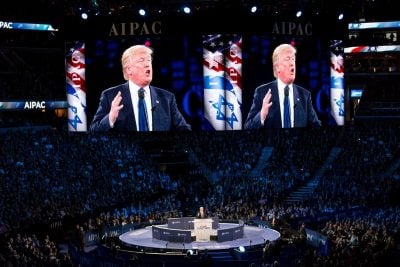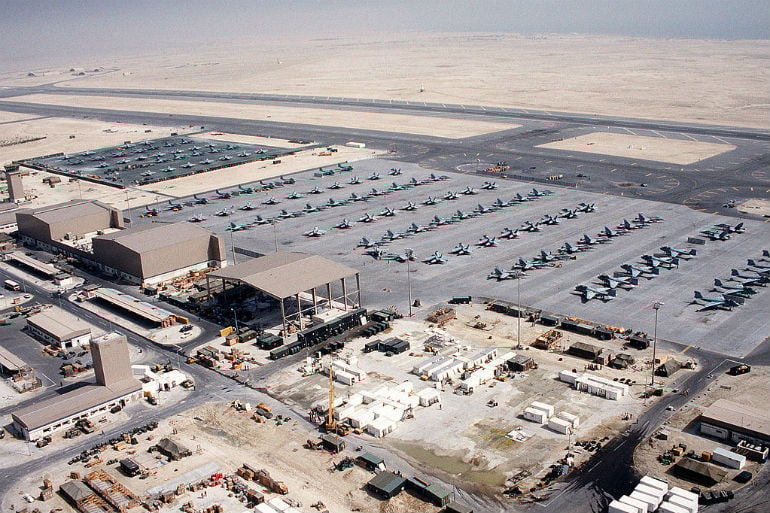Trump’s Parting Gift to Israel. The Integration of Israeli and Arab Forces
The integration of the Israel Defence Forces (IDF) alongside Arab troops within US Central Command (CENCOM)

Donald Trump has used his four years as US president to demonstrate his deep commitment to the Zionist state of Israel. He has striven to enable Israel to take control of occupied Palestine with an iron grip, and given it the upper hand in the region. No other US president has given Israel as much as Trump: none dared to recognise Jerusalem as the unified capital of the colonial state; none dared to move the US Embassy to the holy city; none dared to acknowledge Israel’s annexation of the occupied Syrian Golan Heights; none dared to give legitimacy to Israel’s settlements on occupied land; and none dared to accept Israeli annexation, including Benjamin Netanyahu‘s plans to impose sovereignty on the occupied Jordan Valley. For good measure Trump also stopped US donations to the UN Relief and Works Agency for Palestine Refugees (UNRWA) in an effort to annul the whole refugee issue.
Trump’s most recent gift to the Israelis was the so-called Abraham Accords. Under his patronage, the UAE, Bahrain, Sudan and Morocco normalised relations with Israel last year.
His parting gift to the occupation state, however, is the integration of the Israel Defence Forces (IDF) alongside Arab troops within US Central Command (CENCOM), which has a base at Al-Udeid Air Base in Qatar. (image below)
This is something Israel has been waiting and hoping for. From this we can deduce that Gulf reconciliation between Saudi Arabia, the UAE and Bahrain on one side, and Qatar on the other, was achieved on direct orders from the Trump White House.
American Jewish organisations have been pressing Washington to include the IDF in CENTCOM in order to link Israeli national security to America’s, but previous administrations have always refused this, given the sensitivity between the Arab countries and the occupation state.
The latest decision seems a bit academic, however, given that the IDF has had a strong presence at the heart of US military decision-making for a number of years, and the fact that America’s wars in the Middle East, especially in Iraq, have been fought in defence of the occupation state and to maintain its hegemony.
This was actually confirmed after the second Gulf War, when General Norman Schwarzkopf, commander of the US Central Command between 1988 and 1991, proudly told Israeli leaders that he had destroyed the Iraqi army on their behalf in Operation Desert Storm.
The Jewish Institute for National Security of America (JINSA), the members of which include former US and Israeli military leaders, has finally succeeded in pressuring Trump to make this dangerous decision. It will allow the occupation state to officially and effectively participate under the umbrella of CENTCOM in any military operation alongside Arab forces.
Before this move, Israel was within the scope of the US leadership in Europe but not the Middle East, to avoid any problems about coordination between Israel and Arab troops. With the exception of Egypt and Jordan, no Arab countries had peace treaties with Israel. That has all changed.
The Trump administration has thus put the other Arab countries on the spot as they are facing a fait accompli of having to coordinate military activities with Israel. This affects Saudi Arabia and Kuwait in particular, as they already coordinate militarily with the US forces based in their countries which are subject to the authority of CENCOM. Qatar too, of course, which hosts the command structure, under General Frank Mackenzie. With Israel now also under CENCOM, Arab countries will be under more pressure to accept normalisation after the occupation state has basically become a protector of them and their regimes.
The US Central Command is the most powerful military force in the Middle East. It was established in 1983 to enhance American capabilities in confronting the Soviet invasion of Afghanistan, and in light of the escalation of the Iran-Iraq war. This imposed US domination over the Middle East. Having achieved its target in that respect, the new target became Islam.
Under the banner of the so-called “war on terror”, sparking a low level third world war, CENTCOM became responsible for managing it, with operations in Iraq, Syria, Afghanistan and the Gulf. It has specific strategic goals set by the Pentagon, as it supervises coordination with the countries that “host” — not that they have much choice — US forces operating from military bases in the Gulf. Strategies drawn up include all Arab armies in the Middle East, as well as Afghanistan and Pakistan, in addition to the security mission against Iran. Adding Israel to these forces makes it an active element in US military operations in the Middle East.
This necessarily means coordination, planning and military cooperation between the occupation army and the Arab armies; they are now arms of the same body, as we will see in any war in the region, with Iran for example; or another crisis in Gaza against which war will be waged under the pretext of fighting “terrorism”. What will the Arab position be in such scenarios if their forces are allied with Israel? Who will they stand with?
This “Arab-Israeli NATO” is supported by the US and I predicted that it would happen in the wake of the Abraham Accords, because political, economic and cultural normalisation falls short unless it is crowned with military normalisation. The latter is the whole point of these normalisation deals, which were pushed through solely to serve the interests of the Zionist entity.
Arab issues are now surrounded completely by America, all within the broader project known as the deal of the century. General Frank MacKenzie can go anywhere in the region without being controlled or monitored, and can collect intelligence about any and all Arab countries. Of course, this will be shared with Israel, which will expose Arab security even more in the next phase of the colonial re-conquest of the Middle East. Indeed, what we call Arab national security may disappear from the political lexicon, becoming “Israel-Arab national security” instead.
“The easing of tensions between Israel and its Arab neighbours subsequent to the Abraham Accords has provided a strategic opportunity for the United States to align key partners against shared threats in the Middle East,” said the Pentagon. According to JINSA, placing Israel within CENCOM was delayed due to the hostility of the Arab countries towards the state. “But the agreements opened the doors to achieve a strategic goal that was not possible [before].”
Indeed, this military normalisation would not have happened had it not been for the deals struck last year which dealt a blow to the notion of Arab unity; there will be catastrophic consequences. Nevertheless, the ordinary people are optimistic that they will be able to overcome this latest disaster that the dictatorial regimes have created. The regimes may be Zionist, but their people are not.
*
Note to readers: please click the share buttons above or below. Forward this article to your email lists. Crosspost on your blog site, internet forums. etc.
Dr Amira Abo el-Fetouh is an Egyptian political columnist.
Featured image: US President Donald Trump speaking at an AIPAC conference, Washington DC, 21 March 2016 [Lorie Shaull/Flickr]


